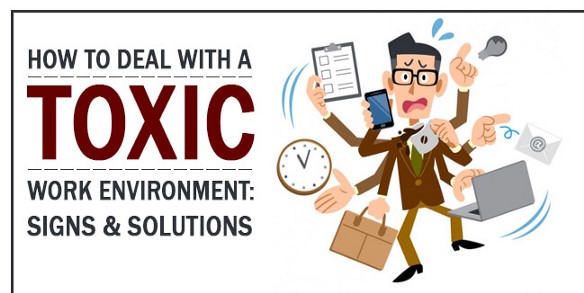All jobs have a dose of stress attached to them. Whether you’re in human resources or software development, the bad days are inevitable. However, some jobs come with something more than just stress. Sometimes, the thought of going to work makes you depressed, tired, and physically ill. In this case, it’s not about work stress only – it’s a sign of a toxic work environment.
There’s a multitude of factors that can contribute to toxic workplace behaviors. It can be terrible corporate values that completely that disregard work-life balance or bad bosses that are contributing to a toxic work environment. Whatever the reason, a toxic workplace can quickly destroy your motivation, attitude, and performance.
In this article, we will discuss 5 signs of a toxic work environment and 3 strategies to get rid of a toxic workplace.
Physical Signs of a Toxic Work Environment
Taken into consideration that most of us spend the majority of our days at the office, toxic workplaces don’t bode well for our emotional or physical well-being.
According to a recent study, not only that toxic work environments are on the rise, but workplace stress is also compromising our mental health. The authors of the research tried to find the correlation between toxicity in the workplace and symptoms of insomnia. What they found is that the determining factor is the mental replaying of a negative event or a disturbing interaction with a co-worker even long after the workday has passed.
Another research over the last 20 years has discovered that toxic work environments can lead to increased depression, substance use, and health issues.
In a recent article by coach and human-behavior professor Melody Wilding, she points that a toxic or hostile workplace can damage everything from your self-esteem to your friendships. It can negatively affect your health and lead to sleepless nights, constantly feeling vigilant, sweaty palms, and a racing heartbeat.
If you believe that your workplace has negatively affected your health, then it’s time to see if there’s anything you can do to feel better.
Additional Reading: Danger! Signs of a Toxic Workplace – 3 Ways to Fix It
Workplace signs of a toxic environment
Here are 5 telling signs you may be working in a toxic office environment:
1. Poor communication
Do you feel like you can’t communicate with your co-workers openly? Or ask them for help? Or maybe, you feel like you’re left out of the loop when it comes to important information. Lack of communication is a sure sign of toxic workplace culture. You don’t receive assistance from your co-workers, feedback from your manager, or help from the HR department. When you do communicate with your team, it’s always negative and harsh.
2. Everyone looks miserable
A person who’s happy at work walks into the office with a smile on their face. If in your office, people show up miserable, motivationless, and unhappy, then chances are you’re trapped in a toxic work environment.
3. High turnover
If you’ve been at your workplace for nearly a year now and you’ve seen countless people leave the job, then that is a sign of a toxic workplace. Employees are more likely to leave when the workplace culture doesn’t offer anything good except for negativity, stress, poor morale, and miscommunication.
4. Employee sickness
The stress of being part of a dysfunctional office for a prolonged time can lead to job burnout, fatigue, and depression. If your co-workers are often calling in sick or seem sick while they’re at the office, that’s another sign of a toxic work environment.
5. Oppressive boss
Is your boss monitoring your every move? Do you feel like they’re eagerly waiting for you to mess up and yell at you afterward? Toxic bosses don’t give a word of advice or words of encouragement. They would expect you to come to work even if you were in a serious health state. If your boss is unwilling to listen to their employees and can’t openly communicate with them, then you might be experiencing an oppressive boss.
Most importantly, trust your instincts. If you feel in your gut that something isn’t right and this isn’t the right place for you, chances are you’re probably right.
Additional Reading: Generational Diversity at the Workplace: Benefits, Challenges, and Tips for Success
How to handle a toxic work environment
Don’t get discouraged because there is good news! This part is dedicated to 3 ways how you can cope and handle the negative effects of toxic work culture and help you rising above a toxic workplace.
Psychological detachment
Psychological detachment means to avoid work-related thoughts or emotions. By encouraging a healthy work environment you can help your employees prevent burnout and turnovers. Additionally, it will help organizations grow happily, where toxic workplace behaviors are discouraged.
Detachment can be encouraged through activities such as:
- Vacations
- Weekend getaways
- Social times with family and friends
- Exercise or other hobbies
Relaxation
Another way to handle the stress of a toxic work environment is by practicing relaxation during non-work time. When people try to relax, they often report feeling healthier and suffering less from stress and exhaustion. Relaxation can be a significant moderator of the relationship between negative work thoughts and insomnia symptoms.
Some activities that promote recovery and relaxation include:
- Meditation
- Yoga
- Talking a walk
- Listening to music
- Volunteering
- Spending time with friends and family
Additional Reading: 5 Strategies for Attracting and Retaining Millennial Talent
Start your exit strategy
If you find yourself in a concerning health condition even after trying psychological detachment and relaxation techniques, then it might be time to leave your job. A search for a new, more fulfilling job can make you happier and motivated in life. Be sure to let others know that you’re open to new opportunities for work. When the day comes, hand in your resignation proudly, knowing that you did your best and deserve more.









